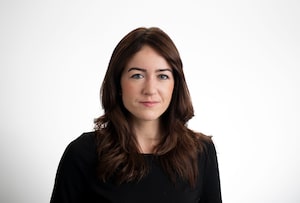Maryam Masoomi, who is helping a group of refugees from Afghanistan make their way to Canada, stands for a photograph outside her home in Saskatoon on Jan. 20, 2022.Liam Richards/The Globe and Mail
In a hostel in Islamabad, more than 150 Afghans are waiting for Canadian visas so they can join members of their community who are settling into their new lives in Saskatoon. Many in the hostel, including young women, had to leave their families behind.
Last September, about 250 refugees escaped Afghanistan, with most travelling overland to Pakistan, fortunate to have had visas arranged by a Toronto-based charity, Prince’s Trust Canada. They are primarily members of the Hazara minority and include students who attended Kabul’s Marefat High School, which champions women’s rights and democratic values.
But as those in Saskatoon ease into their new routines, with adults going to language classes and children going to school, members of their community are waiting for word from Immigration, Refugees and Citizenship Canada. There are 157 people, including 50 unaccompanied young women, in Pakistan, and 52 people, mostly girls, waiting in Afghanistan.
One young woman in the hostel said fleeing the country was her only option to survive, even though it meant leaving her family behind. She remembers watching her little brother cry, asking what was happening. She said her dream is to see her family again. Luckily, she has her sister with her. Still, they don’t know what will happen and they don’t feel safe where they are.
The 22-year-old said she wants to reach Canada to get a master’s degree, continue her education and help others. The Globe and Mail is not identifying any of the individuals to protect their safety.
Also in the hostel is a 14-year-old who sang in a popular music group. She said that when the Taliban took over, she was frightened. The first thing to be afraid of in a Taliban society, she said, is being Hazara, being a girl and finally being a girl with social activities. She is all three, she said.
She wants to come to Canada and become someone who can help people there, and in Afghanistan. Life has not been easy, she said, adding that she feels lucky to be with her mom, two brothers, sister and her sister’s husband. And her friends in Saskatoon continue to offer support, calling on video chat and trying to keep their hopes up.
Her 28-year-old sister also went to Marafat, later going to Bangladesh to take an undergraduate degree in politics, philosophy and economics. She hopes to go to Canada to work and help those left behind.
The effort to evacuate the Marefat School community began after the Taliban took control of the country in August, and was aided by Thirty Birds Foundation, Prince’s Trust Canada and the Raoul Wallenberg Centre.
Mark Fell, Prince’s Trust Canada chair, said he has advocated for the school community, and in the early days of evacuation efforts, reached out to IRCC to arrange visas.
Abuzar Royesh, the son of the co-founder of the school, and founding member of Thirty Birds Foundation, helped co-ordinate the evacuation, along with a small group of volunteers. The foundation was set up to support the girls in Pakistan and Saskatoon.
Mr. Royesh said Canadian officials would not accept unaccompanied minors, and so they prioritized girls younger than 18 and their families, which is why one group was evacuated before the other. Those who remain in Pakistan, he said, include 105 women and girls, and 50 are unaccompanied. As well as some younger girls and their families.
Mr. Royesh said it took Ottawa about two weeks to approve the first group of people, and it has been months since the second list of names have been submitted and they still have not heard if they will be approved. He’s hoping they hear soon, and that the girls will be resettled in Saskatoon.
“For the single girls who are unaccompanied, the only family they have in this world outside of Afghanistan is in Saskatoon.”
When asked at a press conference last week if Ottawa would issue visas to those left behind in the hostel, Immigration Minister Sean Fraser said he is aware of the group and will work with partner organizations to help those who qualify under the government’s program.
“But we do need to focus on getting them here through pathways that protect the integrity of the process and allow more people to arrive as quickly as possible,” he said.
Maryam Masoomi, 26, has safely made it to Saskatoon and is hoping her friends and community members join her there soon.
“They are so worried about their future and they are so upset. They hope to come here soon and start their life because their education, their work, is all gone.”
Ms. Masoomi was one of the first to cross the border into Pakistan, a scary experience, she said. She helped others who followed with paperwork, guiding them through how to behave when stopped by the Taliban and ushering them through the process at the border.
She said her family is settling in, they have found an apartment and bought new furniture. “We are safe here, we have security here. We have many facilities here and we can dream.” She said her 13-year-old sister is in school, and her 21-year-old brother and her mom are taking language classes. “They are so happy now,” she said.
Ms. Masoomi was leader of the music group that included the 14-year-old from the Islamabad hostel. She said that when the rest of the members arrive, they will come together again, and continue singing.
 Janice Dickson
Janice Dickson